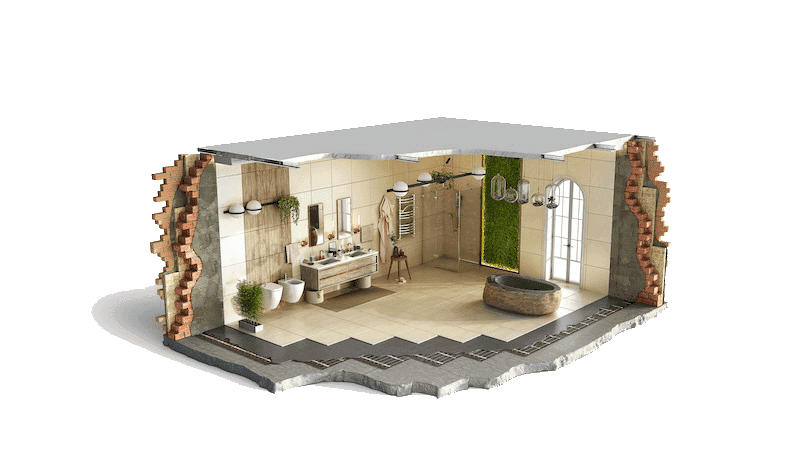We typically think of the aesthetic elements when it comes to websites, but there are a bunch of moving tech parts involved in setting up a site that’s rock solid for your business.
But, when you just want a website that’s pretty and does cool things, it can get a bit confusing knowing your page builder from your plugins or why your website designer keeps talking about this ‘SSL’ thing.
Enter an analogy to help explain your website building basics.
Building a website is like building a house.
It all starts with a piece of land…
Heads up – this article contains affiliate links (they’re marked with an *). If you choose to purchase using my link, thank you! It may mean I receive a commission but it’ll be at no extra cost to you.
Hosting
To build a house, you need a block of land.
That’s what website hosting essentially is. You’re purchasing a piece of virtual ‘land’ from a host like Siteground*, Cloudways*, VentraIP* or Flywheel so your website has somewhere to live on the World Wide Web.
Domain Name & IP Address
You can think of your domain name (e.g. butterdigital.com.au) in the same way as the street address of your house (e.g. 123 Main Street, Sydney). It’s where you tell people they can come and visit you.
Your IP address is a string of numbers that is like the metropolitan or regional area your house is located in.
Just like you don’t typically refer to the regional area you live in when you invite someone to come and visit you (e.g. Grampians Region if you’re in Victoria or Northern Inland if you’re in New South Wales), your IP address isn’t a detail that you need to remember or will use on a day-to-day basis.
WordPress
WordPress is a free open-source content management system that is like the concrete slab of your house. It’s what gives your website the foundational structure which everything else is built upon.
Website Theme
Once you have your slab, you put up the frame of the house. Your website theme (e.g. Hello, Astra etc.) provides those internal bones of your website like the frame and walls of your house.

Page Builder
You’ve got your foundations poured and the frame and walls are up, now we can get onto the fun stuff – like paint colours, benchtop materials, cabinet designs, floor surfaces, tapware etc.
Your website’s page builder is what gives you the flexibility and freedom to design the pages of your website however you like.
More and more people are turning to drag-and-drop page builders in addition to a bare-bones theme to design their websites because it is a much easier way to customise the look and feel of your website without having to know a bunch of code.
My fave page builder (and the one I use for my clients’ sites) is Elementor*, but Divi*, Oxygen and Breakdance are other popular page builders.
Plugins
Your website plugins are similar to all the bells and whistles you can add to your house like surround sound to pipe music throughout your whole house, a swimming pool, heated floors etc.
On your website, plugins are the things that give your website extra functionality, performance and customisation.
The sky is almost the limit when it comes to the types of plugins you can add to a website built on WordPress (which is why I love building with WordPress over other platforms), but a few common ones include:
- A robust form builder like Fluent Forms* or Gravity Forms to take new client enquiries
- Plugins like WP Rocket* to increase speed, performance and security
- WooCommerce which adds a shop to your website if you want to sell digital or physical products
- Recipe plugins like Tasty Recipes* and WP Recipe Maker* so you can easily create beautiful recipe cards your readers can cook along to
SSL Certificate
Your SSL certificate is like the locks on the doors to your house (and you’ll know whether a website has an SSL certificate installed if you can see the little lock icon in the URL bar on your screen).
In website terms, it lets visitors to your website know they can securely share information like their email address and payment information and is an absolute must-have for your website.
The End Result
All of the website building basics work together to create a solid, functional, speedy and visually appealing digital home for your business.
And, just like building a house, if you’re missing that internal structural integrity of great hosting, a reputable theme and plugins, SSL certificate and page builder you’re in for stressful times when your website breaks (in the same way houses start crumbling around you or leak water ?).
This may not be the most technically perfect analogy, but I hope it helps you visualise and conceptualise all those techy bits and pieces if you don’t need in-depth knowledge about what they’re all for in the day-to-day operations of your business.
Want to partner with a website designer who will build you a website AND step you through the essential stuff you need to know to operate and maintain your website confidently? Get in touch I’d love to help!


